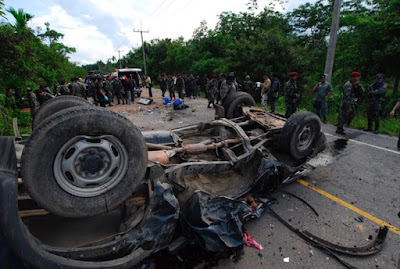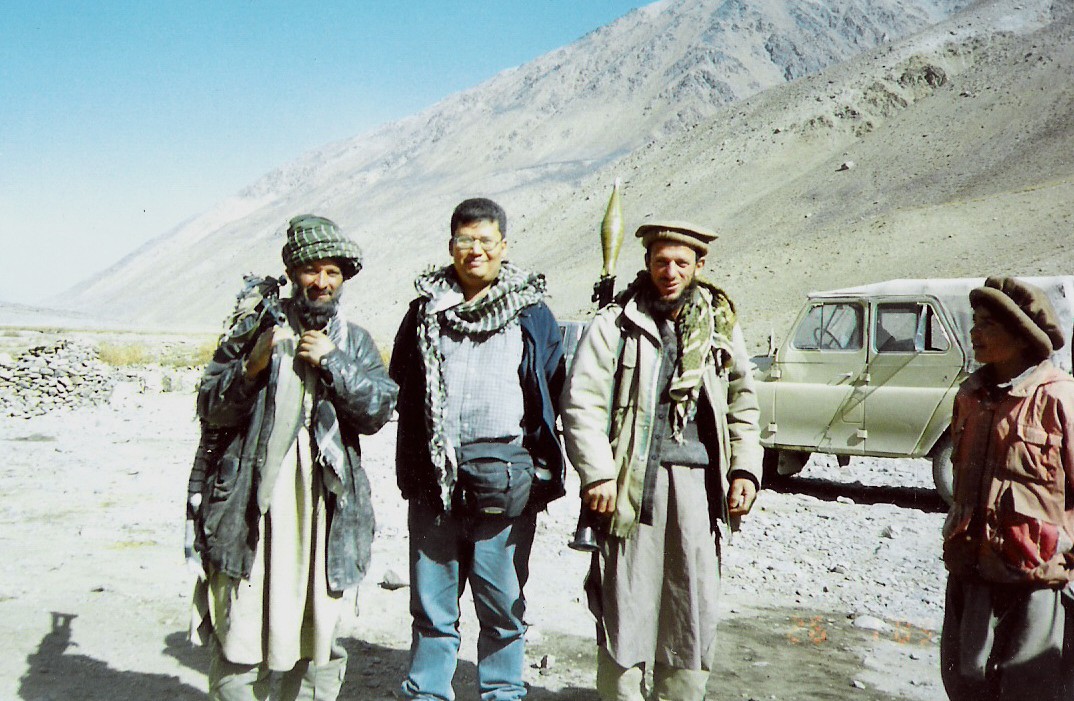Yala, Thailand
For the past 13 years, insurgents in Thailand’s Deep South have launched major attacks during Ramadan. They’ve done this to remind security forces of an alleged crime that occurred when the Islamic holy month, which follows a lunar cycle, fell in October 2004: the Tak Bai massacre.
 |
| File Photo: Roadside bombing in Narathiwat. CHAIWAT PUMPUANG |
This year Ramadan-time attacks started a little early, on May 20, when multiple ATMs were bombed simultaneously about half an hour after Muslims broke fast and the streets were empty.
The attacks were carried out in at least 14 locations in four southern provinces, Yala, Narathiwat, Pattani, and Songkhla. Most of the blasts took place meters from military checkpoints, thus adding to the humiliation of the troops.
Sending a message
Violence in Thailand’s Malay-speaking and predominantly Muslim Deep South is political in nature. It’s a form of communicative action.
In many places around the world, video cameras and social media are often used to send out a message behind an attack. Often, the intended audiences are policymakers and the general public, who may be halfway around the world.
On the other hand, the audience for the insurgency in Thailand’s Deep South is still pretty much confined to the security forces and the agency bosses. It’s a form of deadly messaging between two warring sides.
What goes into public space, including social media, doesn’t always reflect the reality on the ground.
Unlike other insurgent groups in Southeast Asia, Barisan Revolusi Nasional (BRN), the one longstanding group that controls virtually all of the rebels in the Thai Deep South, does not have an identifiable spokesman who can verify incidents on the ground.
This makes it much more difficult for academics and researchers to map the violence in this conflict.
Public statements come “once in a blue moon” and, usually, it is a one-way street, meaning reporters cannot ask thorough questions.
The narratives and explanations of incidents are provided by a government spokesman, but it doesn’t mean that the public living in this historically contested region believe them.
As residents of this region, where political violence comes in waves, Muslims and Buddhists have come to terms with things such as pro-government death squads who have no qualms about shooting indiscriminately into a tea shop full of villagers; or a gunman pumping two bullets at close range into the back of a person’s head because he or she was a government informant.
In one instance, a roadside bomb aimed at an incoming military patrol also claimed the lives of innocent bystanders who happened to be at the wrong place at the wrong time.
Islamic leader gunned down
Many understand that this violence is political in nature. For those who’ve lost a loved one, no explanation could ever help overcome the personal tragedy.
Just days ago, the deputy chairman of the Islamic Committee of Pattani, Aduldej Chenae, was shot dead by a gunman at close range. Like the killings of top figures in the region, his murder generated all sorts of theories and motives.
Was he killed because of personal reasons? Or because he was too involved in the Safety Zone, a yet to be implemented ceasefire between the Thai government and a network of a longstanding separatist group called MARA Patani? Nobody seems to know the answer.
Nevertheless, Aduldej’s death raised the issue of the personal safety of individuals who are involved in conflict resolution. It is tempting to suggest that BRN, whose ruling council does not endorse the talks, had a motive to assassinate him.
Longtime observers of the conflict also pointed to the senseless killings of other high-profile figures. These included the fatal shooting of Waesumae Sudden in September 2014.
Like Aduldej, Ustaz Mae was also a resident of Saiburi district in Pattani province.
The Thai Army claimed it had been working closely with the two men to lay down the foundation for what would be official “Track 1” talks between the government and MARA Patani.
As expected, fingers were pointing back and forth. The BRN and Thai military accused each other of ordering the killings.
Ustaz Mae, as he was known to the locals, was said to be the acting secretary-general of the Dewan Pimpinan Parti (DPP), the ruling council of the BRN.
Some said he was removed from his post for helping the Thai government with its peace initiative.
Three months prior to the launching of the peace talks with the government of then-Prime Minister Yingluck Shinawatra in February 2013, a village imam, Abdullateh Todir, was killed in Yala’s Yaha district.
Abdullateh was a resident of Tambon Patae, an extremely “red” area.
Being an imam in Patae, one would have to be blind not to know the insurgents in the area, one security official reasoned. This made the imam a good candidate to act as a go-between, said the officer, who spoke on condition of anonymity.
But somebody felt he was too close to the insurgents and, therefore, he had to be “eliminated.” His death set off a series of vicious retaliation that lasted six weeks.
Abdullateh’s death also drove a wedge between security forces and the Islamic committees in the provinces of the Deep South. Abdullateh was a member of the Islamic Committee of Yala.
In the end, when the Yingluck peace talks were launched, none of these Islamic committees would endorse the initiative.
It is important to note that not all Thai security agencies sing to the same sheet music. Disagreement is rife on all sorts of issues, such as the official negotiation itself.
Indeed, there are many sectors in Thai society and state agencies that are turned off by the idea of top officials sitting and talking to Patani Malays, whom they consider to be criminals, more or less.
Targeted killings in this restive region are all too common. But they hardly ever solve the immediate problem. Often, these killings become part of the narratives promoted by the warring sides and stakeholders of the conflict.
Don Pathan is a Thailand-based security and development consultant for international organizations. Artef Sohko is the chairman of The Patani, a civil society organization dedicated to critical discussion on the conflict in Thailand's Deep South. The opinions expressed in this commentary are those of the authors and not of BenarNews.
This version revises an earlier headline that referred to the killing of Aduldej Chenae, the deputy chairman of the Islamic Committee of Pattani.

